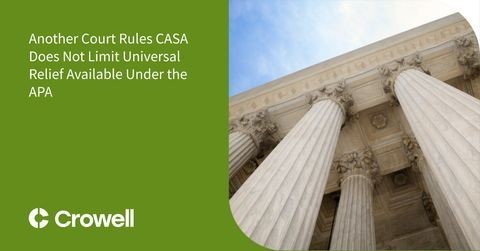ASBCA Rejects the Government’s Use of "Prior Material Breach" Affirmative Defense
Client Alert | 1 min read | 09.24.19
In Engility, LLC, ASBCA No. 61281 (August 19, 2019), the ASBCA denied the government’s motion to amend its answer to include the affirmative defense of prior material breach. The matter involved the government’s disallowance of settlement costs paid by Engility following a lawsuit in which Iraqi plaintiffs alleged that Engility’s employees engaged in abuse at Abu Ghraib. Before the government’s motion, the parties had engaged in costly and time consuming discovery after the government argued that under Geren v. Tecom, Inc., 566 F.3d 1037 (Fed. Cir. 2009), Engility had to demonstrate that none of its employees engaged in the alleged abusive conduct, and therefore the Iraqi plaintiffs had very little likelihood of success on the merits. Engility opposed the government’s motion to amend its answer because, among other reasons, the amendment would exponentially expand the scope of already extensive discovery. The ASBCA requested supplemental briefing on the government’s motion, which clarified the government’s position: the affirmative defense of Engility’s alleged prior material breach would be invoked only in the event the Board found that Engility’s settlement costs were allowable and, thus, the government’s disallowance would breach the contract’s Allowable Cost and Payment clause. The government also stated that it did not intend to argue that Engility’s alleged prior material breach was related to the Iraqi plaintiff’s allegations. In denying the motion, the Board stated that “It is a legal impossibility for the government to raise the affirmative defense of prior material breach as a defense against what the government itself admits is essentially the possibility that its own claim may fail.”
Contacts
Insights
Client Alert | 3 min read | 01.05.26
Another Court Rules CASA Does Not Limit Universal Relief Available Under the APA
In Trump v. CASA, the Supreme Court significantly constrained the equitable authority of federal district courts to grant universal or nationwide injunctive relief, clarifying that, with specific exceptions, a federal court’s power to grant relief is limited to the parties before it. When it was issued, many bemoaned CASA’s implications for preventing government overreach.
Client Alert | 7 min read | 01.05.26
Consideration of Artificial Intelligence in Arbitration Terms of Reference
Client Alert | 4 min read | 12.31.25
Raising the Bar: New York Expands Consumer Protection Law with FAIR Business Practices Act
Client Alert | 4 min read | 12.30.25





